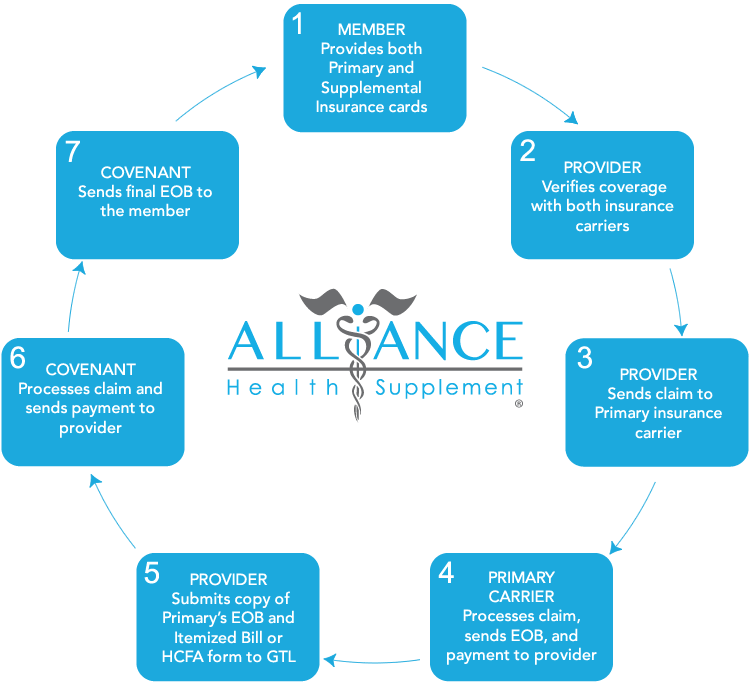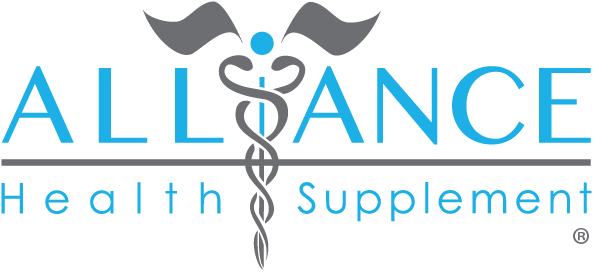About
Alliance Health SupplementWhat is Alliance?
Alliance Health Supplement is a product that complements a comprehensive major medical plan with a supplemental health insurance product that is administered by Covenant Administrators, Inc. and underwritten by Guarantee Trust Life Insurance Company (GTL) under the brand name Alliance Health Supplement. This product can be customized to work in conjunction with any primary health insurance provider in the marketplace. Alliance Health Supplement is not a replacement for your primary coverage, but rather a supplement to your primary carrier’s health plan. Simply put, Alliance Health Supplement pays the member’s portion of an eligible medical claim (i.e., copays, deductibles, and coinsurance) up to annual maximum benefit. Benefits are may be directly to the healthcare providers upon submission of the patient’s Itemized Bill or HCFA and the Primary Carrier’s EOB.
 Alliance Health Supplement is one of the few benefits that an employer can provide, which is universally beneficial. When implemented with the help of an Alliance consultant, your organization’s overall health insurance premiums should decrease and your employees will experience a dramatic reduction in their out-of-pocket expenses.
Alliance Health Supplement is one of the few benefits that an employer can provide, which is universally beneficial. When implemented with the help of an Alliance consultant, your organization’s overall health insurance premiums should decrease and your employees will experience a dramatic reduction in their out-of-pocket expenses.
Alliance Health Supplement also provides numerous advantages with regards to Healthcare Reform, including reducing the burden of compliance within the “Affordability Clause” of the PPACA by allowing employers to reduce single and family rates, all the while strengthening their health plans. Alliance is also helping employers large and small achieve premium stability by allowing great flexibility when picking a primary insurance plan design and by reducing the company’s claims experience with their primary provider.
Claims Process
One of the unique advantages of Alliance Health Supplement is that healthcare providers are able to file all of the claims for patients via an electronic payer code that is clearly labeled on the member’s secondary insurance card (note providers can also file US mail). Here is how the claims process works:

Guaranteed Trust Life Insurance Company 
Founded in 1936, Guarantee Trust Life Insurance Company is a legal mutual reserve company located in Glenview, Illinois which provides a portfolio of competitive health, accident, life and special risk insurance programs.
For over 79 years, the company has benefited from the direction of the Holson family whose consistent top-level leadership and management continue to provide us with a clear vision of who we are and where we’re going.
The family values on which we were founded motivate us to build on the importance of our personal customer service, quality products and successful relationships. Through our independent agents and brokers, we serve individuals and families in 49 states and the District of Columbia.
Covenant Administrators, Inc.
The Covenant Administrators, Inc. is a Healthcare Risk Management Practice specializing in comprehensive Third Party Administration Services, Results-Based Risk Management Strategies, Funding & Plan Management through data analytics/data mining and member advocacy and lifestyle management techniques provided on a wholly integrated delivery model coupled with the highest level of personalized and flexible customer service from dedicated and seasoned professionals. Complete satisfaction and fulfillment of all your TPA and Managed Healthcare needs is our covenant to you.
Company Profile
- Established in 1992 with a focus on Healthcare Risk Management.
- Our dedicated staff serves our clients with a minimum of 10 years of experience in the industry.
- 98%+ financial accuracy in claims adjudication.
- 98%+ procedure accuracy in claims adjudication.
- With offices in 3 states, local clients receive prompt and proficient service.
- Risk Management initiatives to reduce the cost of providing healthcare.
Mission Statement
“The Covenant family of Companies exists to serve customers with best-of-class healthcare benefits risk management and administrative services through efforts of forward-thinking associates, efficient processes and leading technologies, all to the glory of God.”
Alarming Healthcare Statistics
U.S. Bankruptcies
- 62% of U.S. individual bankruptcies are due to medical bills and most of those who filed for bankruptcy were middle-class, well-educated homeowners. 92% of these medical debtors had medical debts totaling less than 10% of pretax family income. (Source: The American Journal of Medicine.)
- 78% of these individuals that filed for bankruptcy due to medical bills had health insurance. (Source: The American Journal of Medicine.)
 Out-of-Pocket Costs
Out-of-Pocket Costs
Annual out-of-pocket responsibility for families covered by employer-sponsored health insurance in 2012 was $4,316. (Source: The 2012 Employer Health Benefits Survey, the Kaiser Family Foundation and the Health Research and Educational Trust (HRET), September 2012.)
Deductibles
- Nearly 30% of privately insured, working-age Americans with deductibles of at least 5% of their income had a medical problem but didn’t go to the doctor. Around the same percentage skipped doctor-recommended medical tests, treatments or follow-ups. (Source: Commonwealth Fund)
- The percentage of covered workers in a plan with a deductible of at least $1,000 for single coverage grew from 31 percent to 34 percent in the past year. Covered workers in small firms remain more likely than covered workers in larger firms (49 percent vs. 26 percent) to be in plans with deductibles of at least $1,000. (Source: The 2012 Employer Health Benefits Survey, the Kaiser Family Foundation and the Health Research and Educational Trust (HRET), September 2012.)
Average Recovery Rates
- Hospitals – 11.3 percent. (Source: ACA International’s Top Collection Markets Survey*, Jan. 1 – Dec. 31, 2012.)
- Non-hospitals – 16.7 percent. (Source: ACA International’s Top Collection Markets Survey, Jan. 1 – Dec. 31, 2012.)
Uncompensated Care/Bad Debt
U.S. hospitals provided $41.1 billion in uncompensated care in 2011, representing 5.9 percent of annual hospital expenses. (Source: American Hospital Association, “Uncompensated Hospital Care Cost Fact Sheet,” January 2013.)
The national average for bad debt is 3.17 percent, 2.21 percent for charity and 5.38 percent for total uncollectable accounts. The Southeast region of the U.S. had the highest percentage of total uncollectable accounts at 6.70 percent. (Source: The Hospital Accounts Report Analysis on Fourth Quarter 2012.)
Underinsured
• As of 2012, 75 million people reported problems paying their medical bills or were paying off medical debt, up from 73 million in 2010 and 58 million in 2005. An estimated 48 million people were paying off medical debt in 2012, up from 44 million in 2010 and 37 million in 2005. (Source: Press release, The Commonwealth Fund, April 26, 2013.)
Premiums
In 2012, annual premiums for families covered by employer-sponsored health insurance averaged $15,745. Premiums rose 4 percent since 2011, but have risen 97 percent since 2002. (Source: The 2012 Employer Health Benefits Survey, the Kaiser Family Foundation and the Health Research and Educational Trust (HRET), September 2012.)
Cost of Care
In 2010, 41 percent of adults (ages 19-64) reported that they had medical debt or trouble paying medical bills, and 22 percent had been contacted by a collection agency for unpaid medical bills. (Source: The Commonwealth Fund Biennial Health Insurance Survey 2012, April 2013.)
Access to Care
In 2012, 43 percent of adults, or 80 million people, said they had skipped or delayed getting needed health care or filling prescriptions because of the cost. This is an increase from 75 million people who reported such problems in 2010, and 64 million in 2005. More than a quarter (28 percent) of adults with a chronic health condition said they had skipped doses or not filled a prescription for their health condition because of the cost. (Source: The Commonwealth Fund Biennial Health Insurance 2012, April 2013.)
Frequently Asked Questions
What is Alliance Health Supplement?
What is a qualified medical event?
Who files and pays the claims?
Is Alliance Health Supplement intended to replace my current health plan or provider?
Does Alliance Health Supplement have a restrictive network?
Is Alliance Health Supplement a HSA, FSA, or HRA plan?
How is Alliance Health Supplement affected by the PPACA (||Obamacare||)?
Will Alliance Secondary Insurance increase the cost of our health insurance?
Are preexisting conditions excluded?
Who underwrites and administers Alliance Health Supplement?
What is needed for an initial analysis?
(1) Current Summary of Plan Description;
(2) Current rates;
(3) Census of employees on your plan;
(4) Amount of HSA, HRA, or FSA employer contributions (if any);
(5) A meeting with an Alliance consultant.


